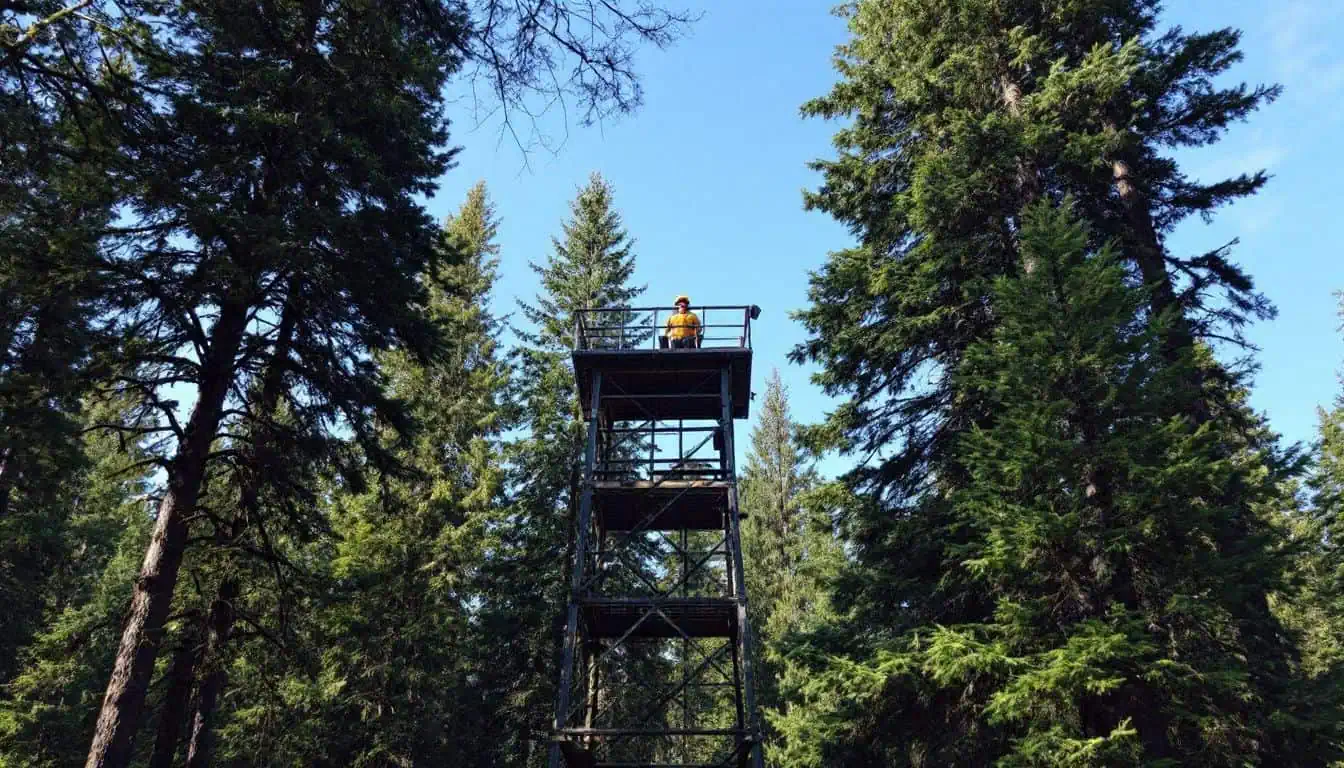Ever wonder what a firewatch does? You’re not alone. Many folks scratch their heads when they hear this job title. Here’s a fun fact: firewatchers can spend weeks living in towers deep in the woods.
In this post, we’ll unpack the five key roles of a firewatch that save lives. Ready to learn about these unsung heroes?
Key Takeaways
Fire watch personnel monitor hot work areas, ensure safety measures are in place, and report hazards to prevent fires on job sites.
Key skills include staying alert, knowing fire safety and emergency procedures, and understanding hot work permit requirements.
Fire watch pros need proper training and certification in fire safety to be effective in their roles.
The job outlook for fire inspectors is expected to grow 11% by 2030, with average salaries around $35,458 per year.
Entry-level requirements are minimal – just be 18+ with a high school diploma or GED to start in this important safety role.
Table of Contents
Fire Watch: Definition and Core Functions
Fire watch is a crucial job that keeps people safe. These pros keep an eye out for fires during risky work like welding. They’re the unsung heroes who stop small sparks from turning into big blazes.
Their main job? To watch “hot work” areas like a hawk. They patrol work zones, making sure fire gear is ready to go. They also look for stuff that could catch fire easily.
I’ve seen firsthand how vital fire watch security is on job sites. These folks don’t mess around – they’re 100% focused on fire safety.
No multitasking here! OSHA rules say we need them, and for good reason. They’re the first line of defense against fires that could start during building or fixing stuff up. Next up, let’s dive into the key tasks these fire watchers handle day-to-day.
Key Responsibilities of Fire Watch Personnel
Fire Watch personnel are the unsung heroes of job sites. They keep a sharp eye out for sparks and smoke, ready to spring into action at a moment’s notice.
Monitor for fires during hot work

Hot work can be risky business. Welding, cutting, and grinding create sparks that could start a fire. That’s where fire watch personnel come in. They keep a sharp eye out for any signs of trouble during these tasks.
Their job? To spot fires before they get out of hand.
Fire watch staff patrol work areas non-stop. They look for flammable stuff that shouldn’t be there. If they see smoke or flames, they sound the alarm fast. OSHA rules say fire watch is a must for hot work.
It’s a key part of keeping workers safe on the job. These folks need to stay alert and know their fire safety basics cold.
A good fire watch is like a guardian angel for hot work sites.
Ensure fire safety measures are in place

Fire watch pros make sure safety gear is ready to roll. They check that fire extinguishers are full and easy to grab. They also look for clear paths to exits. No blocked doors on their watch! These folks keep an eye on sprinklers too.
They want them working like a champ if flames pop up. It’s all about being ready for the worst while hoping for the best.
But there’s more to it than just gear. Fire watchers also set up rules everyone must follow. No smoking near flammable stuff, period. They mark off “no-go” zones where sparks could fly.
And they make sure hot work only happens with the right permits. It’s a tough job, but someone’s gotta do it to keep everyone safe.
Report potential hazards
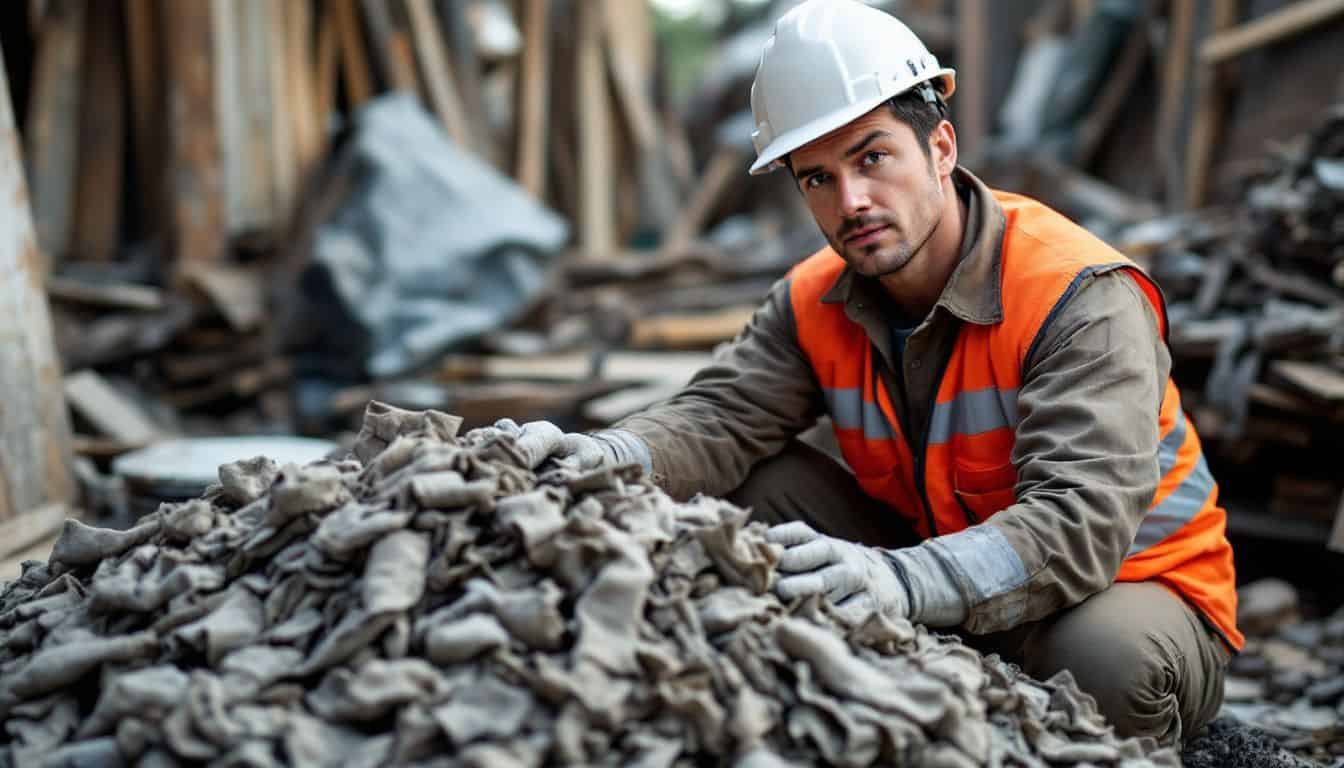
Spotting trouble before it sparks is a key part of a fire watch’s job. These pros keep their eyes peeled for anything that could start a blaze. They check for flammable stuff, faulty wiring, or unsafe work habits.
If they see something fishy, they speak up fast. It’s not just about putting out fires – it’s about stopping them before they start.
Fire watch folks don’t just sit around waiting for smoke. They’re always on the move, looking for signs of danger. They might spot oily rags near a heat source or notice a blocked fire exit.
Whatever the risk, they report it right away. This quick action can save lives and protect property. It’s a big deal in places with lots of fire risks, like construction sites or factories.
Essential Skills for Effective Fire Watch Personnel

Fire watch pros need sharp eyes and quick thinking. Want to know what other skills make them top-notch? Keep reading!
Maintain alertness and precise attention to detail

Staying sharp and focused is key for fire watch pros. These guys need eagle eyes and a nose like a bloodhound to spot trouble before it starts. It’s not just about staring at stuff all day – they’ve got to use all their senses.
Smelling smoke, hearing odd noises, or feeling unusual heat could save lives. And let’s face it, nobody wants to be the guy who missed a spark that turned into a blaze.
Detail matters big time in this job. Fire watch folks can’t slack off for a second. They check safety gear, keep an eye on risky areas, and stay ready to act fast. It’s like being a guard dog for fire safety – always on alert, never dozing off.
This laser focus helps them catch small issues before they become four-alarm nightmares. It’s tough work, but it keeps people safe and buildings standing.
Acquire knowledge of fire safety and emergency responses
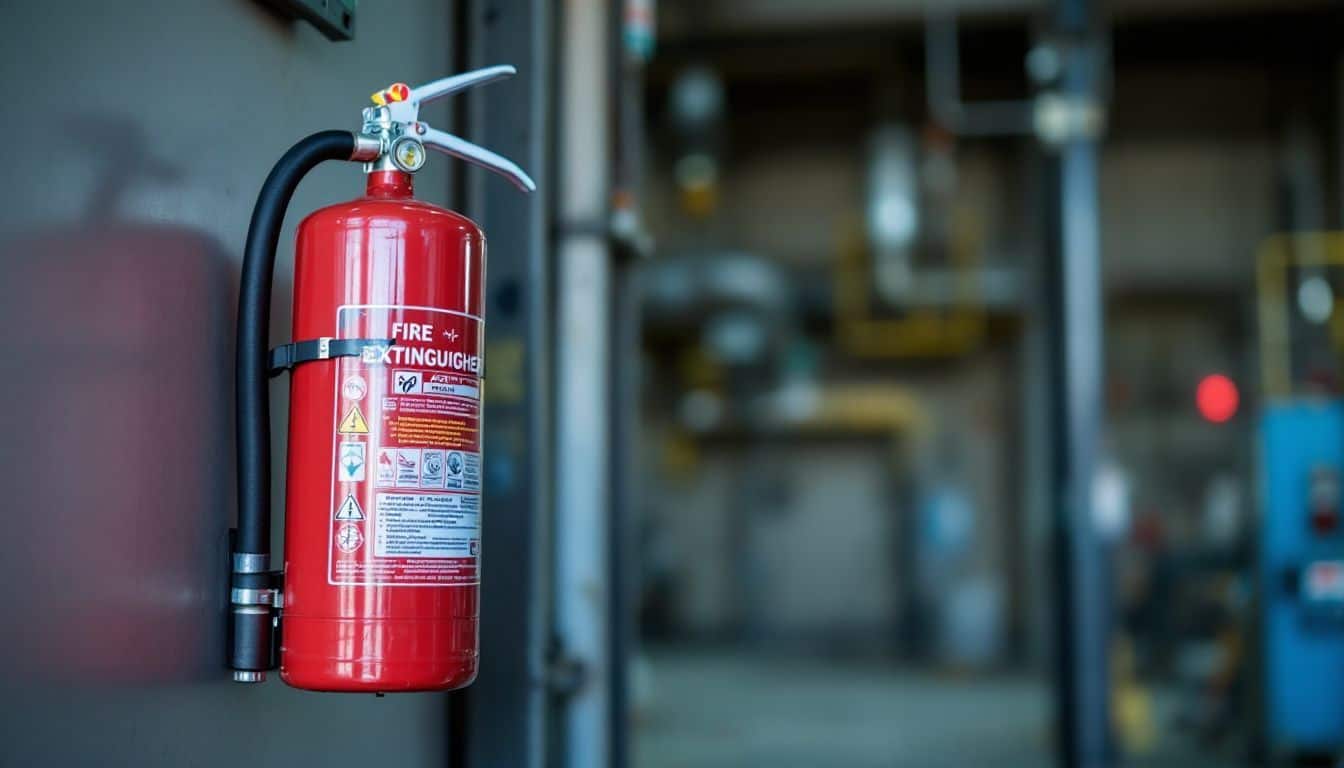
Fire watch pros need to know their stuff about fire safety and emergencies. It’s not just about spotting flames – they’ve got to be ready for anything. These guys learn all about different types of fires, from trash can blazes to electrical sparks.
They also get the lowdown on how to use fire extinguishers, sprinklers, and alarms.
But that’s not all. Fire watchers must know how to act fast when things get hot. They practice evacuation drills and learn first aid. It’s like being a superhero, minus the cape. One fire watch vet told me:.
Knowing what to do in a crisis can mean the difference between life and death. We train hard so others can sleep easy.
Training and Certifications for Fire Watch Personnel

Fire watch pros need top-notch training to keep folks safe. Want to learn more about becoming a fire safety hero? Keep reading!
Complete fire safety training

Fire safety training is a must for anyone on fire watch duty. It teaches you how to spot fire risks and act fast when danger strikes. You’ll learn about different types of fires, how to use fire extinguishers, and the best ways to get people out safely.
This training covers key skills like using portable extinguishers and knowing evacuation plans inside out.
To get certified, you’ll need to put in the hours, pass tests, and show you can handle real-life fire situations. The type of training you pick matters. Look for programs with a good name, solid lessons, and fair prices.
Once you’re certified, you’ll be better at keeping people safe, following the law, and landing good jobs. Plus, you’ll have skills that could save lives one day.
Understand hot work permit requirements

After learning basic fire safety, you’ll need to understand hot work permit rules. These permits are crucial in fire watch – they’re essentially a safety checklist for risky jobs.
You must obtain one daily before starting work. It’s more than just paperwork – it’s a safeguard against danger.
Hot work permits cover tasks that could potentially ignite fires, such as welding, cutting, or grinding. As a fire watch, you’ll need to be thoroughly familiar with these permits. You’ll verify all safety measures are in place and ensure fire equipment is ready.
Your role is to stay vigilant for any issues. Keep in mind, a daily permit is essential – no exceptions. Without a permit, work cannot proceed. It’s straightforward. Your understanding of these rules could be life-saving.
Career Outlook and Compensation for Fire Watch Personnel

Fire watch personnel play a crucial role in keeping workplaces safe. Let’s look at what the future holds for this career and how much you can earn.
| Career Aspect | Details |
|---|---|
| Job Growth | 11% increase in fire inspector jobs by 2030 (U.S. Bureau of Labor Statistics) |
| Average Salary | $35,458 per year |
| Hourly Rate | $15 to $17 per hour |
| Annual Earnings | $30,000 to $40,000 |
| Location Factor | Higher pay in national forests due to on-call nature |
| Entry Requirements | 18+ years old, GED or high school diploma |
| Job Demand | Not high, but maintains safe working conditions |
While fire watch might not be the most thrilling gig, it’s far from jobs where you do nothing. You’re always on your toes, keeping an eye out for danger. Plus, the pay isn’t too shabby. With an average salary of $35,458 a year, you’re not gonna be rollin’ in dough, but you’ll keep food on the table.
Hourly, you’re looking at $15 to $17. That adds up to $30,000 to $40,000 annually. Not bad for a job that doesn’t require a fancy degree. Just be 18 or older with a GED or high school diploma, and you’re good to go.
Here’s the kicker – if you’re up for some adventure, national forests might be your ticket. They often pay more ’cause you’re on-call. It’s like being a superhero, minus the cape.
Now, don’t expect this field to blow up overnight. But hey, an 11% job growth by 2030 ain’t too shabby. It’s steady work that keeps folks safe. And let’s face it, in today’s world, that’s worth its weight in gold.
People Also Ask
What’s the main job of a firewatch?
A firewatch keeps an eagle eye out for fire hazards. They’re the first line of defense against flames. Their job is to spot trouble before it sparks. They check for flammable materials and make sure fire alarms are working. It’s all about fire prevention and keeping everyone safe.
How does a firewatch handle different types of fires?
They’re trained to tackle various fire classes. For Class A fires (wood, paper), they might use water. Class B fires (oil, gas) need foam. Class C fires (electrical) require special care. They know when to use wet chemical extinguishers or when to call in the big guns – firefighters.
What’s the deal with fire towers?
Fire towers are like lookout posts. They give firewatches a bird’s eye view. From up high, they can spot smoke or flames miles away. It’s tough work in all kinds of weather. But it’s crucial for catching fires early.
How does a firewatch help with workplace safety?
They’re the guardians of the workplace. They check emergency exits, sprinkler systems, and water hydrants. They run fire drills and teach employees about fire safety. They make sure everyone knows what to do if there’s a fire. It’s all part of following the life safety code.
What kind of work conditions do firewatches face?
It’s not always a walk in the park. They might work long hours in all sorts of weather. They need to be on their toes, ready for anything. Sometimes they’re in fire towers, other times they’re walking through buildings. It’s a job that keeps you on your feet.
What skills does a good firewatch need?
They need eagle eyes and a cool head. They should know their stuff about fire protection and suppression. Being able to spot trouble before it starts is key. They need to be good communicators too. After all, they might need to explain fire safety to others or write up reports. It’s a job that’s all about keeping people safe.
References
https://responsablestaffing.com/1637/fire-watch/
https://blog.qrfs.com/275-fire-watch-procedures-when-and-how-its-required/ (2019-09-26)
https://www.indeed.com/career-advice/finding-a-job/fire-watch-job-description (2024-06-28)
https://www.impactsafetyinc.com/fire-watch-training-certifications-what-firefighters-need-to-know/ (2023-09-29)
https://tools.niehs.nih.gov/wetp/public/Course_download2.cfm?tranid=2281
